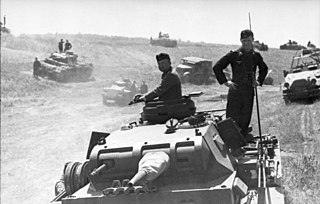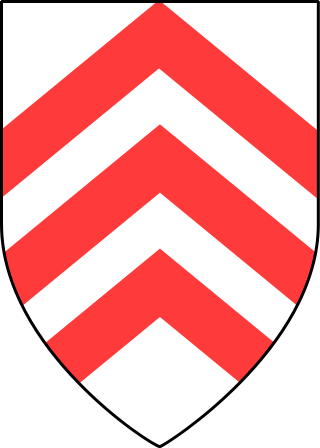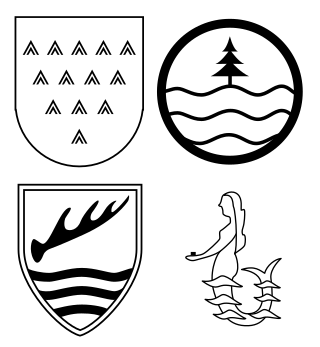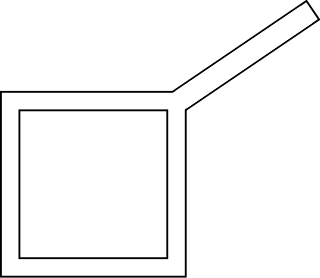The 10th Infantry Division was created in October 1934 under the cover name Wehrgauleitung Regensburg to hide its violation of the Treaty of Versailles. It was renamed the 10th Infantry Division when the establishment of the Wehrmacht was announced publicly in October 1935.
The German 206th Infantry Division, was a military unit that served during World War II. Like most German infantry units it had no motorization, and relied on leg and horse mobility.

The 208th Infantry Division, or 208.Infanterie-Division in German, was a large military unit that served during World War II. Like most German infantry divisions, the bulk of its troops were foot-mobile infantry supported by horse-drawn artillery.

The 13th Panzer Division was a unit of the German Army during World War II, established in 1940.

The 334th Infantry Division was a German Army infantry division in World War II. Originally formed in November 1942, it surrendered to the Allies at the conclusion of the Tunisian Campaign in May 1943. The division was reconstituted on 3 June 1943 in France within the 1st Army, with the staff of the 80th Infantry Division as well as remnants of the old division and replacement units. It spent the remainder of the war serving on the Italian Front.

The German 5th Infantry Division was formed in October 1934 and mobilized on 25 August 1939. The division's troops were garrisoned in Konstanz, Ulm, and Freiburg. When formed, the division consisted of the 1st, 2nd, and 3rd battalions of the 14th, 56th, and 75th Infantry Regiments, the 1st, 2nd, and 3rd Battalions of the 5th Artillery Regiment, the 1st battalion of the 41st Artillery Regiment, and assorted 5th Division support units.

The 6th Infantry Division was a unit of the German Army during World War II.

The 305th Infantry Division was a German Army unit that saw extensive, front-line action during World War II. This division was present at the Battle of Stalingrad, the Battle of Monte Cassino, and surrendered to U.S. Army's 88th Infantry Division in Northern Italy near Trento in late April 1945.

The 32nd Infantry Division of the German Army was mobilized on 1 August 1939 for the upcoming invasion of Poland. At that time, it consisted of the usual German Infantry Division elements: three infantry regiments of three battalions each, one three-battalion regiment of light artillery, one battalion of heavy artillery, a Panzerjäger (anti-tank) Battalion, a reconnaissance (Aufklärungs) Battalion, a Signals Battalion, a Pioneer (Engineer) Battalion, and divisional supply, medical, and administrative units.

The 83rd Infantry Division,, was a German reserve and security formation during World War II.

The 45th Infantry Division was an infantry division of the army of Nazi Germany during World War II. Towards the end of the war, the division was reassembled into a second iteration, the 45th Volksgrenadier Division

The 319th Static Infantry Division was a German Army static division during World War II. It was raised in November 1940 from units of the 87th, 169th and the 299th Infantry Divisions. On 30 April 1941 the 319th Division replaced the 216th Infantry Division in the Channel Islands defense and remained in that position until its capture in May 1945 by British forces.

The 15th Infantry Division was an infantry division of the German Army during the interwar period and World War II, active from 1934 to 1945.

The 197th Infantry Division was a Wehrmacht division in World War II. It was activated on 1 December 1939.

The 50th Infantry Division was a German army division in World War II. It was formed on 26 August 1939 from the Grenzkommandantur Küstrin.

The 81st Infantry Division was an infantry division of the German Army during World War II. It was active from 1939 until 1945 and served primarily on the Eastern Front.

The 122nd Infantry Division was a German infantry division in World War II. It was formed on 5 October 1940 as part of the 11th wave.
The 290th Infantry Division was a German infantry division in World War II. It was formed in the Munster Training Area in Wehrkreis X on 6 February 1940 and surrendered to Soviet forces at the end of the war as part of Army Group Courland.

The XXIV Army Corps was a unit of the German Army during World War II. The unit was re-designated several times; originally being Generalkommando der Grenztruppen Saarpfalz, later Generalkommando XXIV. Armeekorps, then XXIV. Armeekorps (mot.) and finally XXIV. Panzerkorps.
The 416th Infantry Division was a German infantry division of World War II.
This page is based on this
Wikipedia article Text is available under the
CC BY-SA 4.0 license; additional terms may apply.
Images, videos and audio are available under their respective licenses.
















